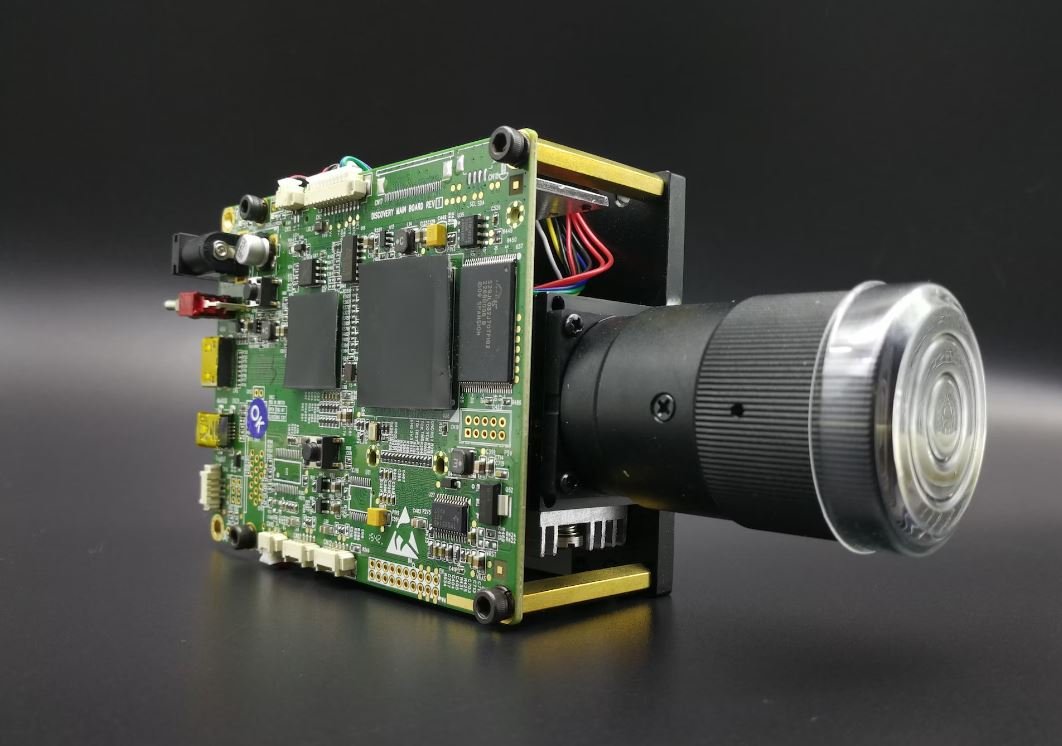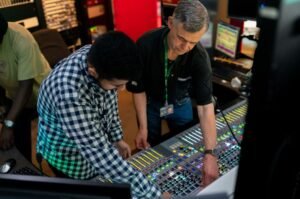AI Tools in Music
Artificial Intelligence (AI) has made significant advancements in various fields, and the music industry is no exception. AI tools have revolutionized the way music is created, produced, and enjoyed. Whether it’s generating music, analyzing trends, or enhancing the listening experience, AI is playing a crucial role in shaping the future of music. In this article, we will explore the different AI tools used in the music industry and their impact.
Key Takeaways:
- AI tools are transforming the music industry through automated music creation, trend analysis, and improved listening experiences.
- AI-generated music is becoming increasingly popular, and it supports musicians and composers in the creative process.
- Music recommendation algorithms powered by AI help users discover new songs tailored to their preferences.
One of the most exciting applications of AI in music is the ability to generate compositions autonomously. **AI-generated music** involves training algorithms on vast datasets of existing music, enabling them to learn patterns and structures. These algorithms can then create original pieces of music, imitating various genres, styles, and even specific artists. *Imagine a computer program composing a symphony that rivals the work of Mozart!* The possibilities for creativity are boundless with AI tools at the helm.
AI tools are also changing the way music trends are analyzed. With the proliferation of streaming platforms and social media, there is an enormous amount of data available to understand what people are listening to and the preferences of different demographics. AI algorithms can analyze this data, identifying patterns, identifying emerging trends, and predicting future hits. *This allows record labels and music marketers to make informed decisions and better connect with audiences.*
Another significant impact of AI tools is the improvement of the listening experience. Music recommendation algorithms, powered by AI, are used by popular streaming platforms to suggest personalized playlists and recommend songs based on a user’s listening history. These algorithms analyze user preferences, their interactions with music, and similar behaviors of other users to make relevant suggestions. *With AI, discovering new music that suits your taste becomes effortless.*
AI Tools in the Music Industry:
Let’s take a closer look at some of the AI tools that are transforming the music industry:
1. AI-Generated Music Platforms:
There are a growing number of AI platforms that can generate fully-formed compositions based on user input and preferences. These platforms leverage machine learning techniques to understand musical patterns and generate unique compositions tailored to individual needs.
| Platform | Description |
|---|---|
| Magenta | A Google project that uses deep learning to create compelling music compositions. |
| Jukedeck | An AI platform that generates royalty-free music for various purposes, such as video content or background music for presentations. |
2. Music Analysis and Trends:
AI tools are used to analyze vast amounts of data, including streaming numbers, social media discussions, and user behavior, to gain insights into music preferences and predict trends. This information helps musicians, producers, and record labels make informed decisions about the direction of their music.
| Tool | Description |
|---|---|
| Spotify for Artists | An analytics tool that provides artists with comprehensive insights into their listeners, including demographic information and streaming patterns. |
| Chartmetric | A platform that offers detailed analytics on music trends, social media impact, and geographical popularity. |
3. Music Recommendation Systems:
AI-powered recommendation systems provide users with personalized song suggestions based on their listening history, enabling them to discover new music aligned with their preferences.
| Platform | Description |
|---|---|
| Spotify | One of the most popular music streaming platforms with an AI-driven recommendation system that creates personalized playlists for users. |
| Pandora | A music discovery platform that uses the Music Genome Project, an AI-based music classification system, to recommend songs based on various attributes and characteristics. |
With AI tools becoming more prevalent in the music industry, the possibilities for creative expression and data-driven insights continue to expand. Musicians and listeners alike can benefit from the advancements in AI, as it enhances the overall music experience. Whether it’s AI-generated compositions, trend analysis, or personalized recommendations, the future of music is undoubtedly intertwined with artificial intelligence.

Common Misconceptions
Misconception 1: AI Tools Can Replace Human Musicians
- AI tools can provide assistance and inspiration, but they cannot replicate the creativity and emotion that human musicians bring to their compositions.
- AI tools lack the ability to understand and interpret complex musical nuances and emotions.
- While AI tools can generate music pieces, it is still up to human musicians to refine and give them a unique personal touch.
One common misconception surrounding AI tools in music is the belief that they can completely replace human musicians. However, this is far from the truth. While AI tools have made significant advancements in generating music, they cannot replicate the depth of musical expression that human musicians bring to the table. AI tools can certainly provide assistance and inspiration, but they lack the ability to understand and interpret complex musical nuances and emotions that are characteristic of human musicians. Despite their potential, AI tools are not capable of replacing human creativity and the personal touch that musicians bring to their compositions.
Misconception 2: AI Tools Can Only Generate Generic Music
- AI tools have the ability to generate a wide variety of music styles beyond generic compositions.
- They can learn from existing music pieces to create unique and original compositions that fit specific genres and moods.
- AI tools can adapt and evolve based on the feedback and preferences of musicians to generate more personalized music styles.
Another common misconception is that AI tools can only produce generic and standardized music. While this may have been true in the early stages of AI music generation, modern AI tools have become much more advanced. They now have the capability to learn from existing music pieces and generate highly tailored compositions that cater to specific genres and moods. By analyzing vast amounts of music data, AI tools can adapt and evolve, resulting in the creation of more unique and original compositions that go beyond generic music styles.
Misconception 3: AI Tools Will Render Musicians and Songwriters Obsolete
- The collaboration between AI tools and musicians can result in new and innovative compositions.
- AI tools can inspire musicians and help them overcome creative blocks, enhancing their creativity and productivity.
- Musicians and songwriters still play a crucial role in providing the personal, human touch that AI tools cannot match.
There is a prevailing fear among some that AI tools will render musicians and songwriters obsolete. However, this is not the case. The collaboration between AI tools and musicians has the potential to result in new and innovative compositions that would not be possible with either party working alone. AI tools have the ability to inspire musicians and help them overcome creative blocks, enhancing their creativity and productivity. Nevertheless, musicians and songwriters still play a crucial role in providing the personal, human touch that AI tools cannot match. The unique experiences, emotions, and perspectives that humans bring to their music cannot be replicated by AI tools.
Misconception 4: AI Tools Are Always Unreliable and Produce Poor-Quality Music
- AI tools have made significant advancements, resulting in the production of high-quality music.
- The quality of music generated by AI tools depends on the training data and techniques used in their development.
- With proper training and refinement, AI tools can produce music that is indistinguishable from compositions created by human musicians.
Many people hold the misconception that AI tools are always unreliable and produce poor-quality music. However, this belief fails to acknowledge the momentous advancements made in AI music generation. The quality of music generated by AI tools primarily depends on the training data and techniques used in their development. With access to extensive and diverse training data, as well as refined algorithms, AI tools can produce music that rivals compositions created by human musicians in terms of quality. When given proper training and refinement, AI tools can create music that is indistinguishable from human compositions.
Misconception 5: AI Tools Will Eliminate the Need for Music Education and Training
- Music education and training are essential for developing a deep understanding and appreciation of music.
- AI tools can enhance music education by providing additional tools for learning and practice.
- AI tools serve as supplements, not replacements, for the knowledge and skills acquired through music education and training.
Lastly, there is a misconception that AI tools will make music education and training irrelevant. However, music education and training play a vital role in developing a deep understanding and appreciation for music. AI tools can be beneficial in enhancing music education by providing additional tools for learning and practice. They can assist students in analyzing musical compositions, suggesting improvements, and offering personalized feedback. Nonetheless, AI tools should be viewed as supplements to traditional music education rather than replacements. The knowledge, skills, and passion acquired through music education and training are irreplaceable and crucial for the growth and development of musicians.

AI Tools for Music Creation
Artificial Intelligence (AI) has made significant advancements in various industries, including music. AI tools are now being utilized by artists, producers, and composers to enhance the music creation process. These tools make it possible to explore new creative possibilities and assist in various aspects of music production. In the following tables, we will explore some fascinating aspects of AI tools and their impact on the music industry.
The Top 10 Songs Created with AI Assistance
AI tools have assisted in the creation of numerous remarkable songs. Below are ten examples of notable songs that were co-created with the help of AI, showcasing the capabilities of this technology in the music industry.
| Song Title | Primary Artist | Date Released |
|---|---|---|
| Electro Dream | OpenAI’s MuseNet | 2019-05-22 |
| I’ll Be Bach | Amper Music | 2018-08-15 |
| Daddy’s Car | Flow Machines | 2016-09-02 |
| Break Free | Sony CSL Research Laboratory | 2016-09-05 |
| A.I. Writes the Songs | Google Magenta | 2020-02-07 |
| Not Easy | AIVA | 2016-12-23 |
| Push Turn Move | Jukedeck | 2015-09-30 |
| Intergalactic Lovers | Humtap | 2019-03-15 |
| EDM Love | Sony CSL Research Laboratory | 2016-09-06 |
| Machine Beats | IBM Watson Beat | 2016-01-22 |
Key Figures of AI Music Innovation
Behind the development of AI tools for music creation, there are exceptional individuals who have contributed significantly to this innovative field. The following table highlights some key figures who have paved the way for AI music innovation.
| Name | Company/Organization | Contribution |
|---|---|---|
| Dr. François Pachet | Sony CSL Research Laboratory | Developed Flow Machines, an AI system |
| Elon Musk | OpenAI | Funded MuseNet and other AI music projects |
| Tom Gray | Jukedeck | Co-founder of Jukedeck, an AI music composition platform |
| Dr. Catherine Schmidt-Jones | Google Magenta | Research scientist specializing in music and AI |
| Pierre Barreau | AIVA | Co-founder of AIVA, an AI music composer |
| Dr. Douglas Eck | Google Magenta | Lead for the Magenta project, advancing AI music technology |
| Jean-Baptiste Thiebaut | Humtap | Co-founder of Humtap, a music-making platform utilizing AI |
| Dr. Joanna Leng | IBM Watson Beat | AI researcher focusing on music cognition and creativity |
| Drew Silverstein | Amper Music | Co-founder of Amper Music, an AI composition platform |
| Dr. Philippe Pasquier | SFU Metacreation Lab | Leading researcher in AI and music composition |
AI Music Tools Comparison
Various AI music tools offer different features and cater to diverse musical needs. The table below provides a comparison of five popular AI music tools, highlighting some key aspects and capabilities of each tool.
| Tool | Primary Feature | Genre Compatibility | Requires Human Input |
|---|---|---|---|
| MuseNet | Compose full musical pieces | Wide range | No |
| Jukedeck | Generate royalty-free music | All genres | Yes |
| AIVA | Create cinematic music | Film scores, classical | No |
| Amper Music | Generate custom music tracks | All genres | Yes |
| Google Magenta | Research and experimentation | All genres | Yes |
AI Tools Used in Popular Music Production
High-profile artists and producers have incorporated AI tools into their creative processes, adding unique elements to their music. The table below presents notable artists who have utilized AI tools and the songs where AI played a significant role.
| Artist | Song Name | AI Tool Used |
|---|---|---|
| Taryn Southern | Break Free | Sony CSL Research Laboratory |
| Sunspring | Sunspring | Benjamin, an LSTM recurrent neural network |
| Kobugi | Rice Wine | Google’s NSynth |
| Ben Geskin | EDM is Dead | Amper Music |
| Popgun | Ping Pong | Jukedeck |
Impact of AI on Songwriting
AI tools have revolutionized traditional songwriting processes by enabling new creative possibilities for musicians. This table highlights the contributions AI has made to the songwriting process.
| Aspect of Songwriting | AI Contribution |
|---|---|
| Melody Creation | AI tools can generate melodic ideas as a starting point for composers. |
| Harmonic Structures | AI can provide suggestions for chord progressions and harmonic motifs. |
| Lyrical Composition | AI algorithms can assist in generating lyrics based on given themes or topics. |
| Arrangement and Production | AI tools offer automated orchestration and production techniques for enhanced song arrangements. |
| Genre Exploration | AI can help musicians explore and experiment with new genres and soundscapes. |
AI Tools for Music Recommendation
AI algorithms have been leveraged to enhance music recommendation systems, ensuring personalized suggestions for music enthusiasts. This table showcases the ability of AI algorithms to recommend music based on individual listening preferences.
| User Profile | Recommended Song | Artist |
|---|---|---|
| Jazz Enthusiast | Take Five | The Dave Brubeck Quartet |
| Hip-Hop Lover | Lose Yourself | Eminem |
| Indie Rock Fan | Wake Up | Arcade Fire |
| Classical Connoisseur | Clair de Lune | Claude Debussy |
| Pop Music Aficionado | Uptown Funk | Mark Ronson ft. Bruno Mars |
AI Tools for Improvisation
Improvisation is a fundamental aspect of music creation. AI tools have ventured into this domain, allowing musicians to explore novel improvisational methods. The table below presents AI tools designed for improvisation.
| AI Improvisation Tool | Features |
|---|---|
| DeepJ | Generates piano improvisations based on user-provided motifs and patterns. |
| ImProgreS | AI system that interacts with a human musician in real-time to create joint improvisations. |
| Impro-Visor | AI jazz improvisation tool that generates leadsheets and supports chord progressions. |
| Neural Jammer | Utilizes recurrent neural networks to create improvised melodies for jam sessions. |
| Ji-Sang | A Korean traditional music improvisation AI that collaborates with traditional musicians. |
Current Limitations of AI in Music Production
While AI tools have progressed significantly, there are still certain limitations that need to be acknowledged. This table sheds light on some of these limitations.
| Limitation | Description |
|---|---|
| Lack of Emotional Understanding | AI struggles to comprehend and convey complex emotional nuances in music composition. |
| Limited Contextual Understanding | AI tools may struggle to interpret cultural context, resulting in compositions that don’t align with the desired musical style. |
| Originality vs. Reproduction | AI tools can reproduce existing musical styles effectively but may struggle with originality and innovation. |
| Intuition and Human Element | AI tools cannot replicate the intuitive decision-making and artistic choices made by human creators. |
| Sound Design and Sonic Exploration | AI tools are limited in their ability to experiment with unconventional sound design techniques and create unique sonic experiences. |
Conclusion
AI tools have revolutionized the music industry, enabling musicians to explore new creative avenues, receive personalized recommendations, and even create entire songs with the assistance of AI algorithms. From co-creating popular songs to providing valuable resources for improvisation and composition, AI tools have become integral to the music production process. However, it’s crucial to recognize their current limitations and the unique contributions that human intuition and emotion bring to the art of music. As AI technology continues to evolve, we can expect further advancements in the intersection of AI and music, leading to exciting possibilities for both musicians and music enthusiasts.
Frequently Asked Questions
What are AI tools for music?
AI tools for music are software or applications that use artificial intelligence technology to assist in various aspects of music creation, production, and analysis. These tools leverage machine learning algorithms to automate certain tasks, generate music compositions, enhance music production, or provide insights into musical patterns and trends.
How do AI tools generate music compositions?
AI tools for music composition use machine learning algorithms that have been trained on vast amounts of existing music compositions. These algorithms can analyze patterns, structures, and emotions in music to generate new compositions that mimic human-created music. They can learn from different musical genres and styles and produce original compositions based on the input criteria provided by the user.
What are the benefits of using AI tools for music production?
Using AI tools for music production can bring several benefits. They can accelerate the creative process by suggesting harmonies, melodies, or chord progressions. These tools can also enhance the overall sound quality by automatically adjusting audio levels, EQ, or applying various effects. AI tools can save time and reduce repetitive tasks, allowing musicians and producers to focus on higher-level creative decisions.
Can AI identify musical patterns and trends?
Yes, AI algorithms can analyze large datasets of music and identify patterns, trends, and similarities between different musical compositions. By leveraging machine learning techniques, AI tools can recognize common characteristics, such as chord progressions, melodic patterns, or rhythmic structures, within a specific genre or across genres. This analysis can provide valuable insights for musicians, producers, and music industry professionals.
Are AI tools replacing human musicians or composers?
No, AI tools are not intended to replace human musicians or composers. Instead, they are designed to assist and augment human creativity in music production. While AI can generate compositions or suggest musical ideas, the final artistic decisions and interpretations are still in the hands of human musicians and composers. AI serves as a tool to inspire, facilitate, and enhance the creative process.
What are some popular AI tools for music?
There are several popular AI tools for music available today. Some notable examples include Amper Music, AIVA, Jukedeck, and OpenAI’s MuseNet. These tools offer functionality ranging from composition generation, music production assistance, and AI-based virtual instruments. Each tool has its own unique features, and musicians may choose the one that best suits their needs and creative workflow.
Can AI tools analyze and classify music genres?
Yes, AI tools can analyze and classify music genres based on their acoustic features, rhythmic patterns, and melodic characteristics. By training machine learning models on large music datasets labeled with specific genres, AI algorithms can learn to distinguish and classify music into different genres or sub-genres. This analysis can be helpful in music recommendation systems, cataloging vast music libraries, or understanding musical trends within specific genres.
Do AI tools have limitations in music production?
While AI tools for music production are becoming increasingly powerful, they still have limitations. AI-generated compositions may lack the emotional depth and creativity of human compositions. AI tools may struggle to capture the nuances and subtleties unique to human expression. Additionally, AI tools heavily rely on the quality and quantity of the training data available, which can impact their overall performance and output quality.
Are AI tools adaptable to different musical styles and genres?
Yes, AI tools can be adaptable to different musical styles and genres. Most AI tools are trained on diverse datasets containing a wide range of musical styles, allowing them to generate compositions or assist in various genres. However, the output quality and accuracy may vary depending on the specific style or genre, as some AI models may be more proficient in certain types of music than others.
How can musicians and producers incorporate AI tools into their workflow?
Musicians and producers can incorporate AI tools into their workflow by exploring different AI software or applications that align with their specific needs and creative style. They can experiment with AI-generated ideas, use AI tools for automatic mixing or mastering, or leverage AI-driven virtual instruments. It is essential to find a balance between AI assistance and human creativity, using these tools as a source of inspiration and efficiency rather than complete reliance.





